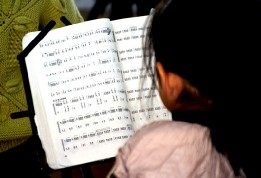Music can be a motivating and fun way to teach all children and in particular children with special needs. It is unquestionable that through the medium of music many essential and enabling life skills can be learned and the benefits that playing and learning music can have on a child's growth and development are immeasurable. For some real life examples, please review our Piano Wizard success stories.
All children have the same need to express themselves and playing a musical instrument can provide an outlet for creative and emotional expression. When we think of music we don't often think of it as therapy. But it can be.
The playing of good quality percussion instruments during music therapy sessions can be of inestimable value for children who have difficulties in hearing, seeing, moving, thinking or responding; each can experience the music in their own unique way. The music is not the goal of music therapy. Cognitive stimulation, self-expression, self-awareness, or increased motor movements are some of the goals that music therapy can focus on and the music itself is simply a tool to achieve these goals.
Listening to music for enjoyment is very beneficial but active participation is even better. For children and adolescents with cerebral palsy, playing music may be an effective way to stimulate speech development and communication skills, express emotions, develop a sense of rhythm and provide opportunity for physical, cognitive and motor development whilst creating an environment for socialisation and fun.
Every child can be helped to learn to enjoy and to become involved in music to some degree and instruments tuned to a harmonic pentatonic scale which produce a soothing sound straightaway, makes playing them an instantly gratifying experience.
Playing music and music therapy has proven to be a very effective method in dealing with autism and aspergers syndrome. Most children diagnosed with Autism or Asperger's lack the social skills that enable them to participate fully in play and other social situations. Interestingly, many children with autism show a heightened interest in music. While they may be unable to easily communicate verbally with others, music is an avenue for many autistic people to express themselves and communicate in a non-verbal, non-threatening manner. Playing music puts the individual at ease, allowing for strides in social interactions to follow.
Easy access to musical instruments may provide an outlet that encourages children to use music to deal with emotional issues, especially when they are unable to express them through speech. Where words fail, music may be a medium through which to explore one's inner world and experiences. Often people with developmental delays and learning disabilities such as Down's syndrome will respond to music. The easy, non-challenging way in which pentatonic instruments can be played offers opportunities for response and expression to children and adults with such developmental delays.
Musical instruments in the classroom or playground offer blind or partially sighted children the opportunity to explore and musical sound and awareness. Instruments, which are simple to play and enable creative experimentation and tactile exploration, encourage the use of motor skills, thus developing coordination whilst stimulating the imagination.
Music is a tool that is used in pain management and healing for children undergoing medical procedures and as a comfort for those who have suffered a traumatic experience. Music can be a powerful distraction, turning the patient's attention away from pain and promoting relaxation as well as to help ward off depression, promote movement and ease muscle tension.
The use of music in group therapy has long been advocated and practiced in the music therapy profession, in addition to the purely musical benefits, playing in an ensemble is useful for working on concepts such as cooperation with others, coordination, and a sense of accomplishment. Making music and singing songs together in a group can build a harmonious cooperative spirit of support and encouragement for everyone. Children who experience severe obstacles in forming relationships with other children, adults and their environment can achieve security and joy in making music. Music making involves many of the fundamental elements of social interaction; turn taking, listening and responding to another person can all be augmented in music therapy.
To see, hear and play musical instruments at school or in community programs is an important cultural experience for every child. While music therapy is an important discipline, you can also achieve benefits from making music on your own. Successful projects include sensory or music gardens where musical instruments have been installed outdoors, making them accessible at break times as well as for use with the curriculum. Playgrounds and outdoor spaces should be viewed as therapeutic settings and an outdoor music centre or garden could enhance learning and development for both children with and without special needs.
Kris Cullum represents Outdoor Musical Instrument suppliers Freenotes, instruments that create enchanting music that anyone can play and are also proven to contribute to Music Therapy.
Article Source: http://EzineArticles.com/?expert=Kris_Cullum
http://EzineArticles.com/?The-Benefits-of-Music-and-Music-Therapy-For-Children-With-Special-Needs&id=2482541
Photo courtesy of Peter Griffin
Learn more about music lessons for special needs children.


Thank you!
Please share Piano Wizard with your friends and help spread the joy.